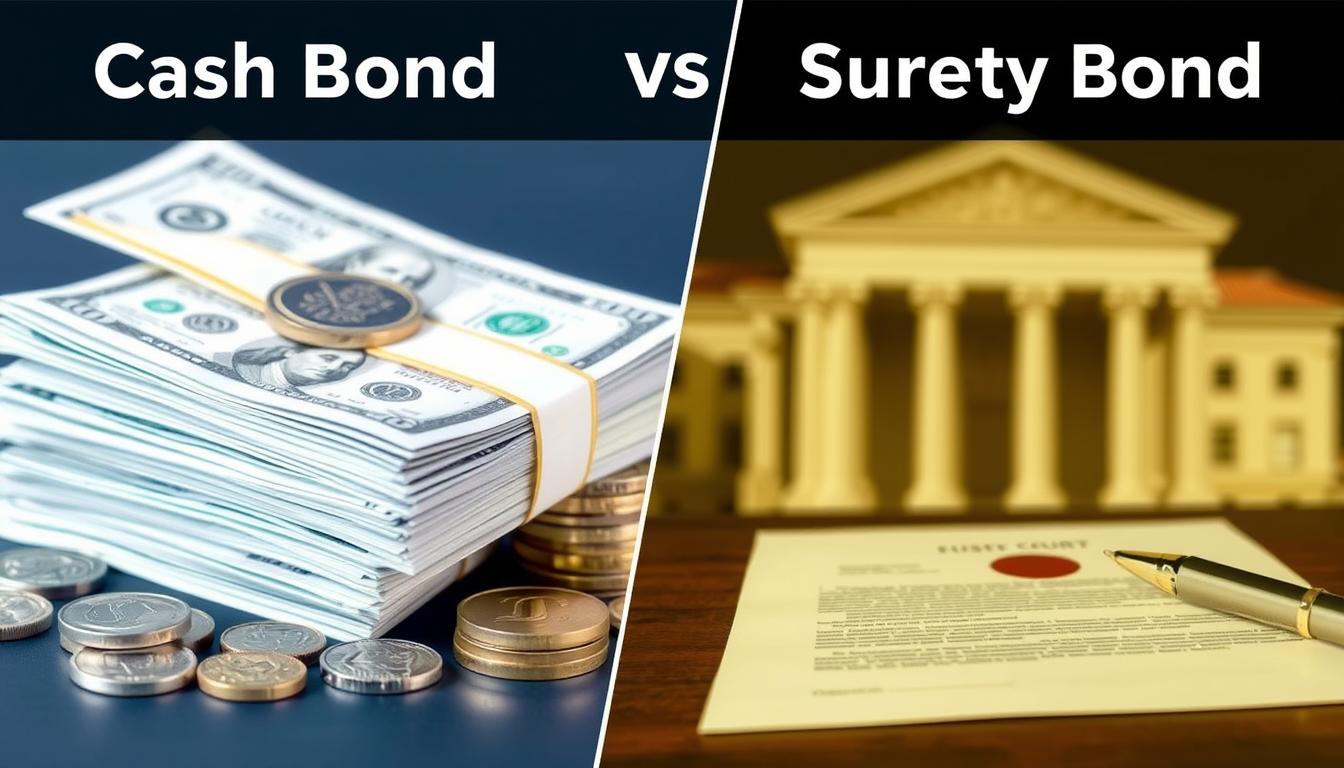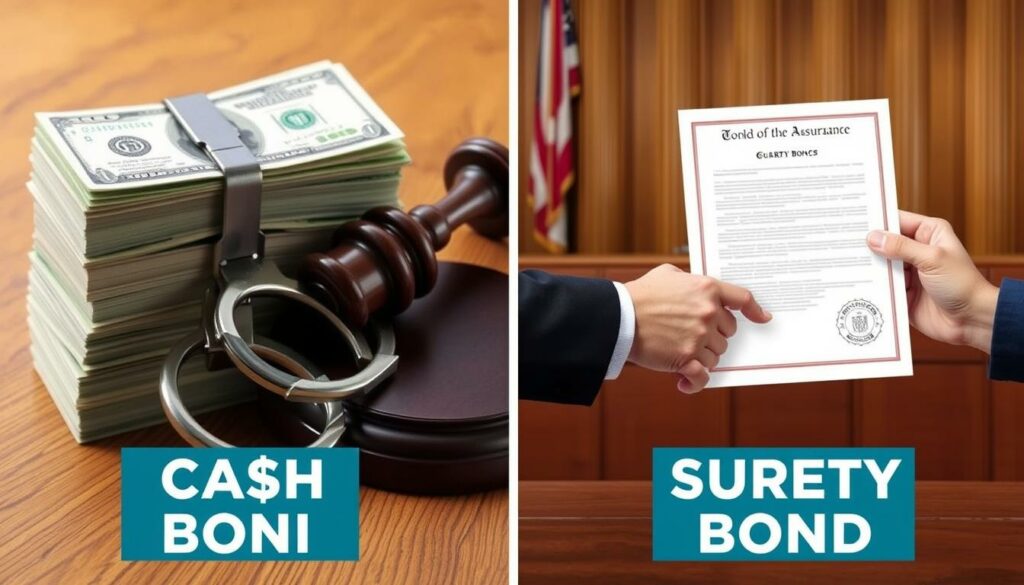
03 Dec Cash Bond vs Surety Bond: Differences Explained
In the complex world of bail bonds, knowing the differences can help a lot. It can affect your money and how calm you feel. Understanding cash bond vs surety bond is key. Each has its own benefits, costs, and steps that shape your choice of bail bond options.
A cash bond means paying the full bail in cash. This money is returned after the case ends. It’s a simple way but needs a lot of money upfront. A surety bond, however, doesn’t ask for all the money at once. You work with a surety agent who promises the accused will show up in court for a fee. This option is more flexible with money.
Both posting bail with cash and surety have their own pluses and minuses. We’ll dive into these in this article. This detailed look will help you choose wisely, thinking about the steps, money matters, and good points of each bond.
Key Takeaways
- Cash bonds require the full bail amount in cash, refundable after the legal process.
- Surety bonds involve a fee and a surety agent to guarantee court appearance.
- Choosing between cash bond vs surety bond depends on your financial situation and preferences.
- Cash bonds offer a straightforward process with immediate release but require significant upfront costs.
- Surety bonds provide more flexible payment options through bail bond companies.
Introduction to Bail Bonds
Knowing about bail is key for those facing legal issues. Bail lets an accused person go free until their trial. They must offer something to ensure they show up in court.
What is Bail?
Many ask, what is bail? Bail is a deal with the court. It’s a promise that the defendant will return for their trial. This balance lets the accused stay free while ensuring they show up in court.
Types of Bail Bonds
There are many types of bail bonds for different needs. Here are a few:
- Cash Bonds: Paying the full bail in cash is simple but expensive. It’s not easy for many to afford.
- Surety Bonds: A bail bond company pays the bail for a fee. Learn more about surety bonds here.
- Property Bonds: The defendant can use property, like a home, as bail.
- Personal Recognizance: Sometimes, the judge lets the defendant go free. They promise to return to court on their own.
What is a security bond for jail? It’s another name for a surety bond. It helps secure the defendant’s release from jail.
What is a Cash Bond?
Understanding bail bonds is key for those in the legal system. Cash bonds are a standout among them.
Definition and Purpose
A cash bond means paying the full bail amount in cash. It makes sure the defendant shows up for all court dates. It’s a way for the court to make sure someone doesn’t skip town.
How a Cash Bond Works
When arrested, a judge might ask for the full bail in cash. This money is kept until the case ends. If the defendant meets all court requirements, the money is usually returned.
When Cash Bond is Required
In some cases, a judge will only accept cash for bail. This is for those seen as higher risks or with past offenses. It’s a way to make sure the defendant shows up for trial.
Cash Bond Advantages
Cash bonds have many benefits, making them a good choice for securing a defendant’s release. Knowing these benefits helps people make better bail decisions.
Ease of Process
One big cash bond benefit is how easy it is to use. You just pay the bail amount directly to the court. This means no complicated steps or extra people needed. Plus, you get released fast, without waiting.
Refund Policies
Cash bonds also have better refund policies than surety bonds. With surety bonds, you usually don’t get your money back. But with cash bonds, you get it all back if the case ends well. This is a big cash bail benefit, giving you peace of mind.
Immediate Release
Another great thing about cash bonds is how quickly you can get out. Since you pay the full amount to the court, you’re free right away. This is important for getting back to your life and preparing for court.
Here’s a table showing the main differences between cash bonds and surety bonds:
| Aspect | Cash Bond | Surety Bond |
|---|---|---|
| Ease of Process | Simplified, straightforward transaction | Involves surety agent, additional steps |
| Refund Policy | Refundable upon case resolution | Non-refundable premiums |
| Immediate Release | Quick release upon payment | Delayed due to processing |
What is a Surety Bond?
Understanding the difference between a surety bond and a cash bond is key in legal situations. A surety bond lets a defendant out on bail without paying the full amount upfront. It’s a promise to the court that the defendant will show up for all court dates.

Definition and Purpose
A surety bond is a deal between three: the defendant, the court, and the surety (a bond company or agent). The surety guarantees the defendant will meet all court dates. This bond lets defendants stay out of jail while ensuring they appear at trial.
Role of a Surety Agent
The surety agent is crucial in the bond process. They check the defendant’s risk and decide if to issue the bond. They handle court paperwork and explain the bond to the defendant. The agent makes sure everyone does their part.
How a Surety Bond Works
The bond process begins when the defendant or their family hires a bail bondsman. They pay a fee, usually a percentage of the bail, to the agent. The agent then promises the court the full bail amount.
If the defendant misses court, the agent must pay the bail. This is different from a cash bond, where the full amount is paid upfront.
Surety Bond Benefits
Surety bonds offer many advantages for those dealing with bail. They help with both money and practical needs. This makes surety bonds a good choice for many.
Affordability
One big plus of surety bonds is how affordable they are. Many can’t afford the full bail. Luckily, bail bond companies let you pay a small part of the bail. This way, you can still get out of jail.
Access to Bail Bond Companies
There’s also easy access to bail bond companies. These companies help with the bail process. They guide you every step of the way. This means anyone needing a bail bond can get help.
Flexible Payment Options
Bail bond companies also offer flexible payment plans. These plans fit different budgets. This makes affordable bail bonds available to more people. It’s great for those who can’t pay a lot at once.
People often wonder, is a surety bond refundable? Usually, the fee for the bail bond is not refundable. It’s because it covers the bail bondsman’s service. But, this fee is much lower than the full bail. So, surety bonds are often a cheaper option.
Cash Bond vs Surety Bond
Understanding the difference between cash bond and surety bond is key in the bail system. These two types of bail bonds aim to ensure the defendant shows up in court. Yet, they differ in how they work and the money involved.

A cash bond means paying the full bail amount upfront in cash. It’s simple: pay the full amount, and if you show up to court, you get it back minus fees. On the other hand, a surety bond lets you use a bail bondsman. They pay the bail for you for a fee, usually 10% of the bail amount.
- Full amount versus percentage: The main difference between cash bond and surety bond is the money needed upfront. A cash bond requires 100% of the bail amount. A surety bond only needs a percentage, which is a non-refundable fee to the bondsman.
- Refund policies: With a cash bond, you get the money back (minus fees) after court duties are done. Surety bonds, however, keep the initial fee paid to the bondsman, no matter the case’s end.
- Availability and accessibility: Cash bonds need a lot of money upfront. Surety bonds are more flexible, helping those without quick access to large sums.
Choosing between a cash bond vs surety bond depends on your financial situation and bail bond needs. Each option has its pros and cons, affecting court attendance and financial planning.
| Aspect | Cash Bond | Surety Bond |
|---|---|---|
| Upfront Payment | Full Amount | Percentage (Non-refundable) |
| Refund Policy | Refundable | Non-refundable |
| Accessibility | Requires Significant Cash | Requires a Bail Bondsman |
Cost Comparison
When looking at bail bonds, knowing the cost differences is key. This part talks about the upfront and long-term costs of cash and surety bonds.
Upfront Costs
A cash only bond means paying the full bail amount to the court. This can be very hard on your wallet.
On the other hand, a surety bond costs less upfront. You pay a non-refundable fee, usually 10% of the bail. This fee goes to the bail bond company, making it cheaper than a cash bond.
Long-term Financial Impact
Thinking about long-term costs is important. With a cash bond, your money is locked up until the case ends. Afterward, you get it back if you follow the court’s rules.
For surety bonds, the initial cost is lower, but the fee to the bail bond company is not refundable. This might seem like a drawback. Yet, it lets you get out of jail without a huge upfront cost.
Here’s a table showing the main financial differences:
| Cost Aspect | Cash Only Bond | Surety Bond |
|---|---|---|
| Upfront Cost | Full Bail Amount | 10% of Bail Amount |
| Long-term Financial Impact | Refundable | Non-refundable Fee |
| Financial Burden | High Initial Outlay | Reduced Immediate Expense |
Knowing these costs helps you decide between a cash bond and a surety bond.
Refund Processes
It’s key to know how refunds work for cash and surety bonds. This section will break down the refund policies. It aims to clear up what you can expect financially after the case ends.
Refund Policies for Cash Bonds
Cash bonds are returned when the defendant meets all court demands and the case is closed. But, it’s vital to know the refund rules of the court handling your case. The time it takes to get your money back can range from weeks to months.
Before you get your money, the court might take out fees or costs. This is why it’s important to check the refund policy of your court.
Refund Policies for Surety Bonds
Many wonder, “do you get surety bond money back”? The answer is no for surety bonds. When someone asks, “is a surety bond refundable”, the answer is also no. The money you pay for a surety bond is for their guarantee of your court appearance.
So, even if you meet all court requirements, you won’t get your bond money back. This is because the fee is for the surety’s service, not a loan.
- Cash bonds are refundable after court conditions are met.
- Surety bond premiums are non-refundable once paid.
| Bond Type | Refund Policy | Conditions |
|---|---|---|
| Cash Bond | Refundable | After case resolution and court conditions met. |
| Surety Bond | Non-refundable | Never refundable, fee is for the service. |
Choosing Between Cash and Surety Bonds
Deciding between cash or surety bonds requires understanding your finances, the legal implications of bail bonds, and your personal situation. This guide will help you make a well-informed choice.
Factors to Consider
When picking a bond, several factors are important. Each bond has its own rules and effects:
- Financial Ability: Check if you can quickly get money. A cash bond needs the full amount upfront. A surety bond only needs a small percentage.
- Nature of the Charge: Look at the seriousness and complexity of the charges. This can help decide between a cash or surety bond.
- Reliability and Support System: Think about the defendant’s chance of showing up in court and their support network. A surety bond can offer extra guarantees to the court.
Legal Implications
It’s crucial to understand the legal implications of bail bonds. A key question is: what is a cash only bond? This bond means paying the full amount and shows a higher risk of not showing up. Surety bonds, offered by licensed companies, can provide legal assurance and reduce financial burden. For more details, check out this in-depth look at surety bonds.
Personal Situations
Personal factors greatly influence the choice between cash or surety. Consider your job, family, and financial future. Each person’s situation is unique, affecting the best choice for them.
| Consideration | Cash Bond | Surety Bond |
|---|---|---|
| Upfront Cost | Full Bail Amount | Percentage of Bail |
| Legal Guarantees | Lesser Legal Protections | Enhanced Legal Protections |
| Financial Impact | Immediate Financial Strain | More Flexible and Manageable |
| Refund Policy | Refunded After Case Resolution | Non-Refundable Fee Paid |
Bail Bond Companies
Choosing a good bail bondsman is key when dealing with bail. It’s a stressful time, and the right person can help a lot. To find a trustworthy company, do your homework and ask the right questions.
Selecting a Reputable Bail Bondsman
Look at a bail bondsman’s credentials, experience, and what others say about them. Good companies have lots of positive feedback. It’s smart to pick someone who is part of groups like the Professional Bail Agents of the United States (PBUS).
Questions to Ask
Before you choose a bail bond company, ask these questions:
- What are your fees and are there any hidden charges?
- Can you provide references from previous clients?
- Are you licensed to operate in this state?
- How long have you been in the bail bond business?
- What is your experience with cash only bondsman services?
These questions help you understand if the bail bondsman is reliable and trustworthy.
Common Pitfalls
Be careful of these common mistakes when dealing with bail bond companies:
- Ignoring the fine print in contracts which might include hidden fees.
- Choosing a bondsman based only on low costs without checking their reputation.
- Not checking if the bondsman is licensed and certified.
Staying away from these mistakes can make the bail process easier and less stressful.
The table below shows what to look for in a bail bondsman and questions to ask.
| Consideration | Important Questions |
|---|---|
| Fees and hidden charges | What are your fees and are there any hidden charges? |
| Reputation and reviews | Can you provide references from previous clients? |
| Licensing | Are you licensed to operate in this state? |
| Experience | How long have you been in the bail bond business? |
| Specialization | What is your experience with cash only bondsman services? |
Being careful and informed helps you choose a good bail bondsman. This way, you avoid problems that could make the bail process harder.
Conclusion
Understanding the difference between cash bond and surety bond is key. Knowing how these options affect defendants and their finances is crucial. Learning about cash bonds and bail bonds can help you choose the best option for your situation.
A cash bond requires paying the full amount upfront. It’s simple and you might get your money back after fulfilling court duties. This is good if you have the money right away and don’t want to involve third parties.
A surety bond, however, uses a bail bond company. It offers flexible financial help for those without a lot of money. A surety agent helps you understand the process and can set up payment plans to ease the financial stress.
Choosing between a cash bond and a surety bond depends on your financial and legal situation. Each has its own benefits and can fit different needs. It’s important to consider these carefully to find the right solution for you.

